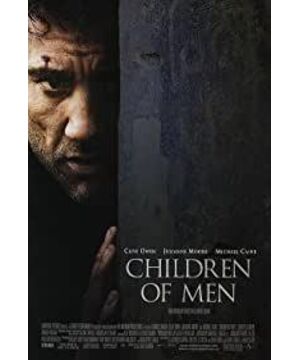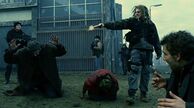The film's biggest premise is that humans have lost their biological ability to reproduce themselves. This is a highly metaphorical narrative motivation. With the declining birth rate, the worsening environmental deterioration, and the development of various biotechnologies, the fear of human extinction has appeared more and more in literature and art since the end of the last century. This kind of worry is different from the fear of the end of the world, and it reflects the vigilance of human beings against their own cultural alienation. A detail that matches this premise is that the big screen on the street in the movie constantly broadcasts an advertisement for a suicide drug, and the male protagonist was once worried that his old friend and wife had taken the drug. The extreme of human cultural alienation is various religious teachings with suicide as the ultimate orientation. In the film, this kind of teaching has become the mainstream of society. Thus, the loss of self-reproduction, although a biological problem, is never attempted to be explained in the film, with the only description being a midwife's recollection of widespread miscarriages in the hospital and the absence of pregnant women. The film's deliberate evasion of biological causes also implies that biological causes are not the root cause of the loss of self-reproduction ability.
If the loss of self-reproduction is seen as a metaphor for cultural alienation, then the film's assumption of the Last Pure Land is full of political implications. Not long after the film started, the film conveyed the message through the pictures and sounds on the TV news that the rest of the world was in riots due to terrorism, and Britain was the only place where human civilization survived, and even an art committee was organized to rescue the rest of the world. At the same time, refugees from all over the world continued to pour in. In order to maintain social stability, the British authorities adopted the method of isolation. Although the film does not show any political operation and government scenes, the experience of the male protagonist shows the social consequences caused by this isolation and control. Terrorist organizations and small-scale riots can be seen everywhere, ordinary people live in precariousness, and society is in The brink of collapse. The film's assumption of the Last Pure Land inherits the critical spirit in literature and art and the vigilance against totalitarian politics.
The two core assumptions, cultural and political, fill the film with strength, centered on the long shot of the film's climax. On one side, the government army was fighting to suppress the rebellion, and on the other side, civilians of all colors in the residential building witnessed the birth of the first baby in 18 years. For those few minutes, the war stalled and everyone made way for the baby, the only release point in the entire film's repression that brought me almost to tears. However, after a short silence, the gunshots sounded again, and the hero and heroine came to the sea through the sewers, waiting for the ships of the Human Council to take them to the unknown world.
Similar to science fiction films such as "War of the Worlds", the film finally gives the audience a mirror-like ending. The crisis seems to be solved by some factor other than the characters' efforts, and the film is over here. But in retrospect, the solution of the crisis by this external factor is false. The human committee is never confirmed in the film, and no one knows whether this committee can guarantee the safety of the baby. This ending actually puts a comedy coat on the tragedy, allowing the film to be read for deeper thinking. Another solution, as shown in "Atonement", is to first show the happy ending imagined by a character, then break it, present the cruel reality, and create information beyond the narrative itself through the change of perspective.
View more about Children of Men reviews











